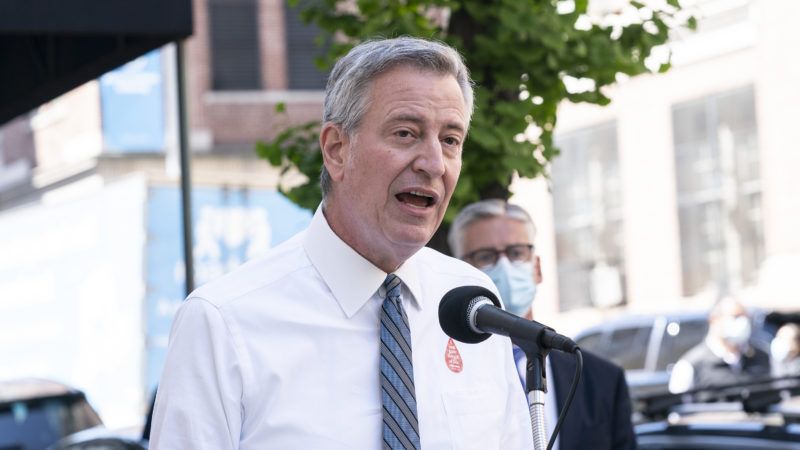Democratic Leaders Praise George Floyd Protesters, Show Utter Contempt for Everyone Else Still in Lockdown
Bill de Blasio and Phil Murphy evince little sympathy for nail salon owners or Jewish mourners.

With widespread mass protests against police brutality underway in major cities all across the United States, one might have expected government officials who do not intend to scold the protesters for violating social distancing to go easier on everyone else as well, at least for consistency's sake. But no—some state and local authorities have given every indication that the COVID-19 lockdowns will continue for small businesses, churches, and anyone else whose cause for leaving the home does not strike the government as sufficiently noble.
On Monday, New Jersey Gov. Phil Murphy (D) thanked state residents for protesting the unjust police killing of George Floyd in large numbers, and commended them for participating in "the transformational moment of our time," even though New Jersey's coronavirus mitigation plan calls for people to gather outside in groups of no more than 25—and in fact, state authorities have fined citizens for organizing anti-lockdown protests. But for Murphy, the two forms of protest are "in different orbits."
"I don't want to make light of this, and I'll probably get lit up by everyone who owns a nail salon in the state," said Murphy. "But it's one thing to protest what day nail salons are opening, and it's another to come out in peaceful protest, overwhelmingly, about somebody who was murdered right before our eyes."
New York City Mayor Bill de Blasio (D), who has repeatedly inveighed against the city's Jewish community for holding public funerals and opening their businesses despite stay-at-home orders, struck a similar note.
"When you see…an entire nation, simultaneously grappling with an extraordinary crisis seated in 400 years of American racism, I'm sorry, that is not the same question as the understandably aggrieved store owner or the devout religious person who wants to go back to services," said de Blasio.
As a reminder, here was what de Blasio had to say to New Yorkers who had gathered to mourn a Hasidic rabbi last month: "My message to the Jewish community, and all communities, is this simple: the time for warnings has passed. I have instructed the NYPD to proceed immediately to summons or even arrest those who gather in large groups. This is about stopping this disease and saving lives. Period."
This is not just hypocritical—it's odious. Protesting against police violence is extremely important, and the unprecedented public outcry over Floyd's death is a critical opportunity to send a message that reforms are needed. But to say that this cause, and only this cause, should be exempt from the lockdown is, at the very least, remarkably callous. Mourning a deceased person is no less important to that person's loved ones than ending police brutality is for the thousands of people engaged in protest. (This should be doubly obvious, since in both cases we are talking about a person's death as the root issue.)
There's nothing theoretical about it. Many, many people across the country have had to alter, or forego entirely, typical funerary customs that offer much-needed closure—at a time when elderly parents, grandparents, friends, and neighbors are dying by the thousands. Christine Rouselle, a reporter for Catholic News Agency, noted on Twitter that her father's outdoor, graveside funeral—which took place just 10 days ago—had to be limited to just 10 people to comply with Maine's pandemic cessation policies.
"My family was led to believe we could be in trouble if we had 11 people gathered at an outdoor event," writes Rouselle. "That clearly isn't the case in Maine today."
It clearly isn't the case if you're protesting police violence. By many government officials' own admissions, they are treating this category of lockdown breakers differently.
There's also something unfair about the plight of the much-maligned nail salon owners—as well as anyone else who owns or enjoys employment at a small business. These entities provide a living for people. They provide economic security, the loss of which often results in hardship and poverty.
We were told that COVID-19 posed such an existential threat that it was necessary for the government to shut almost everything down, even if that meant businesses would fail; even if that meant people couldn't say goodbye to their deceased grandparents; even if that meant churches had to temporarily stop offering spiritual and emotional support to people who depend upon it. For government leaders to celebrate the George Floyd protests while still insisting upon lockdowns for everyone else undermines the all-in-this-together spirit of social distancing.
And it should go without saying, but whether one person's cause for going outside is noble while another person's cause is selfish makes absolutely no difference to the coronavirus.


Show Comments (127)